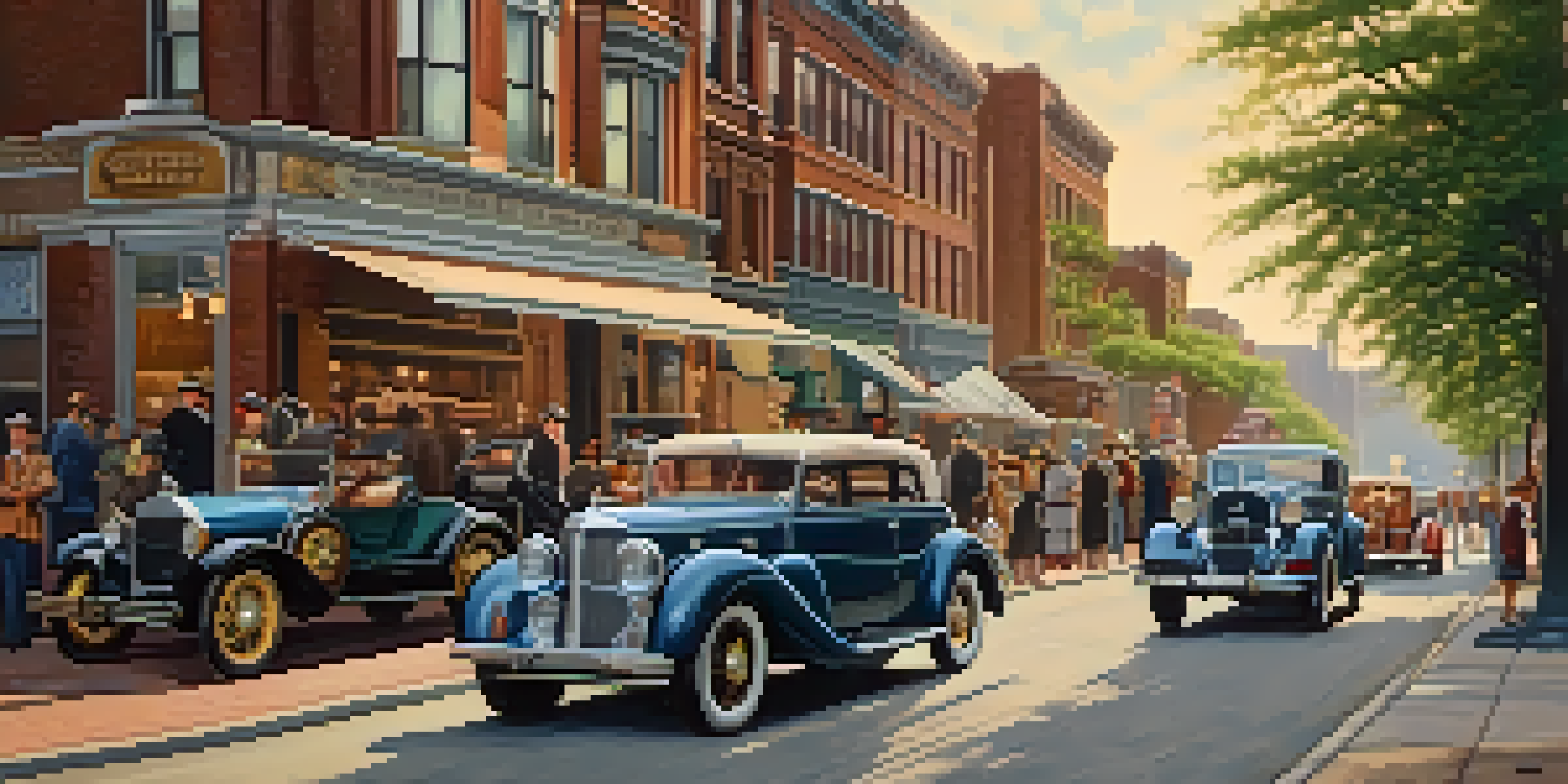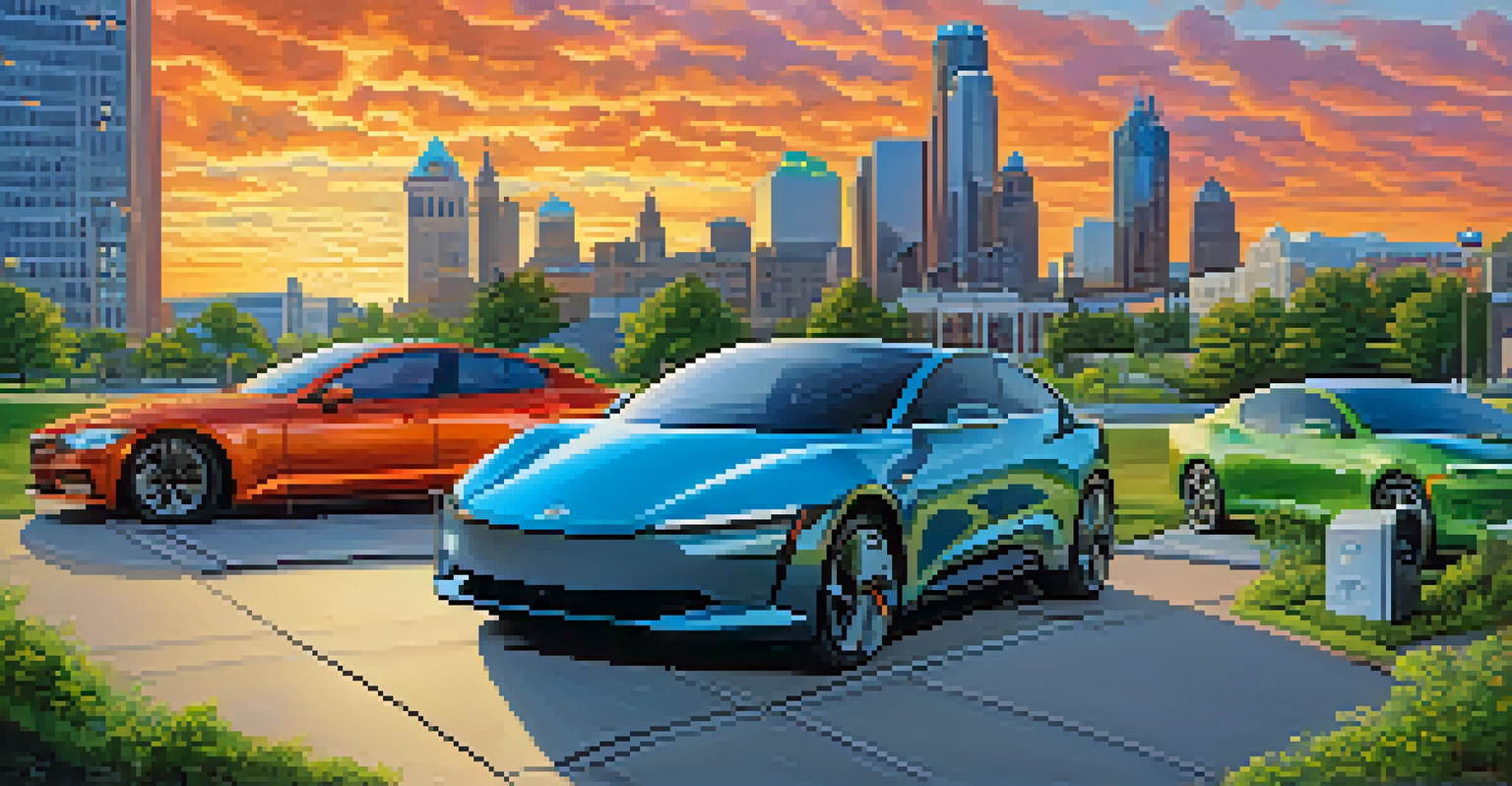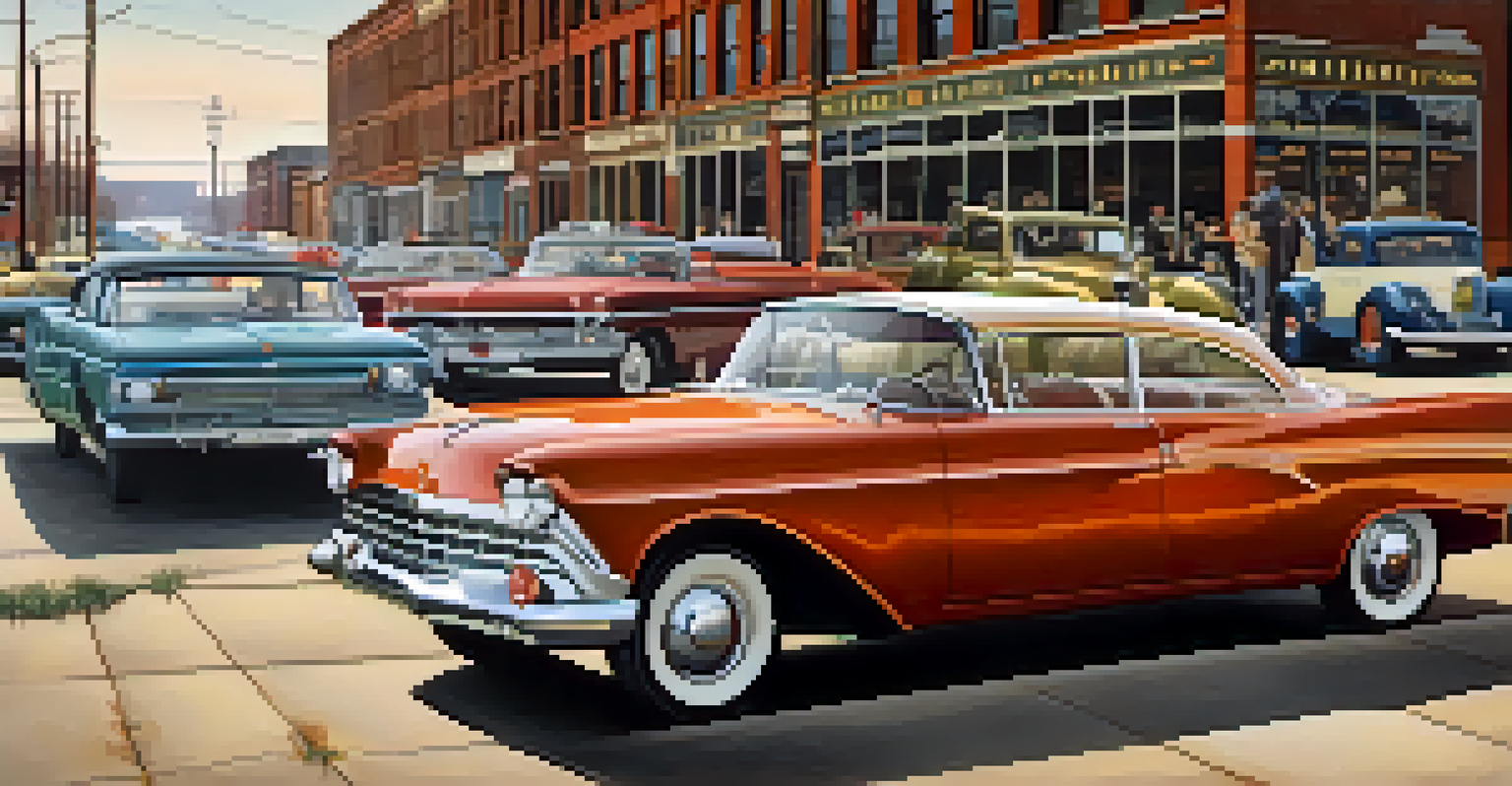The Impact of the Automobile Industry on Detroit's Growth

The Birth of the Automobile Industry in Detroit
Detroit's story begins in the late 19th century, when it became a hub for the burgeoning automobile industry. Henry Ford, with his innovative assembly line, revolutionized car manufacturing, making vehicles accessible to the masses. This not only transformed the city but also set the stage for it to become known as the 'Motor City.'
The automobile is a great equalizer; it allows people to transcend their circumstances and achieve their dreams.
As Ford's factories expanded, they attracted a workforce eager for jobs, resulting in a population boom. The availability of work in automotive plants drew people from rural areas and other cities, fundamentally changing the demographic landscape of Detroit. This influx of workers brought diverse cultures and ideas, enriching the city's social fabric.
With the automobile industry at its core, Detroit rapidly evolved from a manufacturing town into a vibrant urban center. The growth of auto-related businesses, from suppliers to service stations, created a ripple effect, leading to increased commerce and infrastructure development throughout the region.
Economic Growth Fueled by the Auto Industry
The automobile industry served as a significant engine for economic growth in Detroit. By providing thousands of jobs, it helped lift families out of poverty and contributed to the rise of a middle class. The wages earned by auto workers allowed them to purchase homes, cars, and other goods, further stimulating the local economy.

Moreover, the success of Detroit's auto manufacturers attracted numerous ancillary industries, including steel and rubber production. These industries created additional jobs and economic opportunities, cementing Detroit's status as a key player in the national economy. The city's prosperity during the early and mid-20th century is often attributed to this automotive boom.
Detroit's Auto Industry Legacy
The rise of the automobile industry transformed Detroit into a vibrant urban center, significantly influencing its economy and culture.
However, this dependence on a single industry also made Detroit vulnerable to economic downturns. As the automobile industry faced challenges, such as foreign competition and changing consumer preferences, the city had to adapt to maintain its economic stability.
Cultural Shifts Driven by the Automobile Industry
The rise of the automobile industry in Detroit also led to significant cultural shifts. As cars became more affordable, they transformed how people lived, worked, and socialized. Suburbanization took root, with families moving away from the city center to enjoy the comforts of suburban life, facilitated by their vehicles.
Detroit is a city that has been reborn again and again, adapting to the changes in the automotive industry and beyond.
This shift changed the urban landscape, leading to the development of shopping malls, highways, and residential neighborhoods designed for car travel. The culture of mobility became ingrained in the American way of life, with Detroit at its forefront. The automobile was not just a means of transportation; it became a symbol of freedom and progress.
Additionally, the car culture influenced music, art, and fashion, with Detroit emerging as a creative hub. The city produced iconic music genres, such as Motown, which celebrated the spirit of the times, further intertwining the auto industry's impact with the cultural identity of Detroit.
The Role of the Big Three Automakers
General Motors, Ford, and Chrysler, collectively known as the Big Three, played pivotal roles in Detroit's growth. These companies not only provided jobs but also invested heavily in the local economy through factories and facilities. Their presence helped to turn Detroit into the world's automotive capital.
As these automakers thrived, they became synonymous with American industrial might. The Big Three's innovations in design and manufacturing set global standards, and their successes contributed significantly to the city's reputation. However, their influence also meant that the city's fortunes were closely tied to their performance.
Economic Challenges and Adaptation
Despite facing numerous economic challenges, Detroit has shown resilience by diversifying its economy beyond automobiles.
When the Big Three faced challenges, such as economic recessions or shifts towards electric vehicles, Detroit felt the impact profoundly. The need for diversification became clear, prompting discussions about the city's future beyond just automobiles.
Challenges Faced by Detroit's Automobile Industry
Despite its glory days, the automobile industry in Detroit has faced numerous challenges over the years. Economic recessions, competition from foreign manufacturers, and changing consumer preferences have all taken their toll. The 2008 financial crisis was particularly devastating, leading to bankruptcies and significant job losses in the automotive sector.
These challenges forced many companies to restructure and rethink their strategies. The shift towards electric vehicles and sustainable practices has also posed questions about the future of traditional automotive manufacturing. As the industry evolves, Detroit's legacy is being reassessed and redefined.
The decline of the auto industry also had broader implications for the city, leading to population loss, abandoned neighborhoods, and economic decline. However, it also sparked a wave of innovation and resilience as Detroit began to pivot towards new industries and technologies.
The Revival of Detroit: Beyond Automobiles
In recent years, Detroit has been undergoing a remarkable revival, showcasing its ability to adapt and thrive. While the automobile industry remains a cornerstone, the city has diversified its economic base to include technology, healthcare, and arts. This shift is attracting new businesses and residents, breathing new life into the city.
Efforts to revitalize downtown areas have transformed once-abandoned spaces into vibrant hubs of activity. Startups and entrepreneurs are flocking to Detroit, drawn by its affordable real estate and growing creative community. This resurgence is a testament to the city's resilience and its ability to reinvent itself.
Future of Auto Innovation in Detroit
Detroit is positioning itself at the forefront of the automotive industry's future by embracing technological advancements and sustainability.
As Detroit moves forward, it embraces its automotive heritage while also looking to the future. The blend of old and new makes the city a unique place, a living example of how industries can shape and reshape urban landscapes over time.
The Future of the Automobile Industry in Detroit
Looking ahead, the future of the automobile industry in Detroit is intertwined with technological advancements and sustainability. As electric and autonomous vehicles become more prevalent, automakers are investing in innovation to stay competitive. Detroit is positioning itself as a leader in this new automotive landscape.
This transition brings both opportunities and challenges. On one hand, it could create new jobs and industries focused on green technologies. On the other hand, it requires a skilled workforce ready to adapt to the changing demands of the market, which presents a significant challenge for the city.

Ultimately, the future of Detroit will depend on its ability to embrace change while honoring its rich automotive history. By balancing tradition with innovation, Detroit can continue to thrive as a key player in the evolving global auto industry.